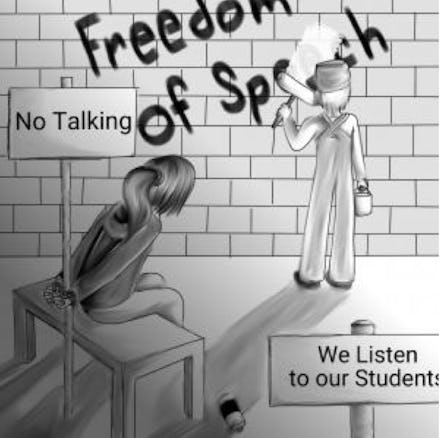These Kids Are Fighting Back After Being Suspended For The Most Ridiculous Reasons

Like many students, Brianna participated in a seemingly harmless prank at school: she plastic-wrapped a toilet seat. But the prank also blemished her spotless record. Brianna, then a middle school student, was suspended and had to answer for her actions in court. Now she attracts unwanted attention from police in her small town.
"I now get continuously harassed by cops in my area," she said, the organization DoSomething.org, told Mic. "I was recently stopped at a football game and searched by three male cops for drugs. The reason they gave me was, 'Based on my past and who I was, they could search me whenever they wanted.'"
And she's not alone. 12-year-old Alexa was handcuffed and arrested for doodling on her desk. Fifteen-year-old Dontadrian was suspended because he held up his jersey number in a photo and it "looked like a gang sign."
These stories reveal a common but severely under-discussed truth about school discipline in this country: Youth of color, LGBTQ students and students with disabilities are punished more frequently and more harshly than their peers for the same actions. While 6.7% of white secondary school students are suspended at some point during their education, 23.2% of their black peers are suspended, as are 18.1% of those with a disability and 10.8% of Latino students, according to UCLA's Civil Rights Project. Meanwhile 1 in 10 students who is not a native English speaker, as well as a tenth of American Indian students, are suspended in school.
But now teen activists across the country taking action to right this egregious wrong.
The campaign: This week, the organization DoSomething.org is launching a campaign called #SuspendedForWhat, encouraging students to tell stories on social media about why they may have been unfairly punished in school and advocate for greater change by meeting with and pressing their school districts directly.
Sharing these stories "validates that this isn't [a single student] being targeted or being victimized by [their] school," DoSomething.org education campaigns specialist Michaela Bethune told Mic. "The fact that this is a national issue gives them a little more faith and courage to hope that we can all together solve this national crisis and that they aren't isolated in their experience."
According to statistics provided by DoSomething.org, these incidents are far from isolated: Black middle school students are suspended nearly four times more often than their white counterparts, and Latino students are about twice as likely to suspended or expelled than white classmates, according to the Vera Institute of Justice. The same study found that high school students with disabilities are three times more likely to be suspended than their able-bodied counterparts.
It's this consciousness that will allow students to advocate for real change. Under the guidance of DoSomething.org, a group of students across the country are meeting with school administrators to reject the zero tolerance policies. The National Association of School Psychologists says these policies "mandate predetermined, typically harsh consequences or punishments" instead of applying the restorative justice practices and policies these students are alternatively proposing.
Why it matters: This disproportionate discipline of already marginalized students highlight the roots of a broader system of racist criminalization in the United States. It contributes to the school-to-prison pipeline, which the American Civil Liberties Union describes as "a disturbing" racialized system in which students of color are "funneled out of public schools and into the juvenile and criminal justice systems."
Non-Hispanic blacks made up 39.4% of the total prison and jail population in 2009, according to the U.S. Bureau of Justice Statistics, and more black adults are restricted by the correctional system today (either by prison, jail, probation or parole) than under slavery in 1850, Mic's Zeeshan Aleem pointed out in February.
In addition to contributing to the school-to-prison pipeline, Bethune observed, this phenomenon generally reinforces biases. A recent study showed, for example, that many teachers do have biases toward students based on race. In some cases this bias is subconscious, but some teachers overtly believe "certain students from certain groups just aren't going to change and it's more of a character flaw that needs to be dealt with outside of the school system," Bethune noted.
Loudly and persistently protesting this biased treatment is not just about discrimination in schools, therefore, but a symptom of a deeply rooted problem. These systems allow schools to contribute to the greater landscape of American racism. Thanks to DoSomething.org, and the many students with whom they're providing invaluable tools and support, we may be that much closer to this reality.